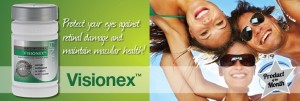
World Glaucoma Week: surely the perfect time to focus on your eyes!
Written by: Ravinder Lilly
Sunday 11th March to Saturday 17th March 2012 is World Glaucoma Week. So, what better time is there to consider your own eye health? Focus on our tips for healthier eyes!
Shield with shades!
Whatever time of year, whenever it’s sunny, protect your eyes from intense sunlight. Too much sun exposure damages the delicate tissues and has also been linked with development of cataracts. Choose good quality glasses which filter blue light and have 100 per cent UV protection.
Screen time and downtime
If you spend long hours working in front of a computer screen (or if leisure time means screen time) be sure to take regular breaks. Even focusing on an object in the distance can help to reduce eye strain.
Nourish yourself
Healthy eating is good for your body and mind and it’s good for your eyesight, too. Opt for plenty of fruit and vegetables. They contain many antioxidant vitamins, minerals and plant pigments that can help to combat the effects of free radical damage helping to keep your eyes healthy.
What are free radicals?
Free radicals are unstable molecules that can damage cells and slow the regeneration process especially with advancing age. Of course, your body has a whole wealth of natural protective processes to guard against free radical damage. But, under certain conditions, these defences may not be strong enough.
What is AMD?
Ageing causes body changes including changes to the eye. For example, age-related macular degeneration (AMD) is the biggest cause of blindness in the over 65s in Australasia. The macula is the part of the eye where the sharpest central vision occurs. The affected person can only see dim images or a black hole in the central of vision although peripheral (outermost) vision is intact.
Don’t smoke
The noxious mix of chemicals in cigarette smoke increases free radicals and robs the blood vessels of oxygen. Smoking increases the risk of age-related macular degeneration (AMD)i and cataractsii. Plus, the heavy metals in tobacco smoke can accumulate in the lens with direct toxic effects that may contribute to cataract formation. Smoking also reduces the levels of two key antioxidants, lutein (pronounced loo-teen) and zeaxanthin (pronounced zay-a-zan-thin).
See your optician
You cannot self-diagnose eye problems such as AMDiii. So, regular check-ups with an optician are essential to ensure that your eyes are healthy. They are also important to ensure that you receive the correct treatment promptly. Your optician will advise you about how often you should come along for an eye check.
The power of plants
What you eat can help to protect your eyes as well as your general health. As well as the antioxidant vitamins and minerals, many studies are examining the potentially protective factors of two plant chemicals, lutein and zeaxanthin. Some experts believe they play a major role in eye health.
More about lutein and zeaxanthin
Both lutein and zeaxanthin are found in high amounts in your eyes. Here, they absorb potentially-damaging blue light and mop up (neutralise) free radicals relieving oxidative stress (this is damage that occurs when free radicals challenges the ability of the body’s natural antioxidant defence system to neutralise free radicals before they cause damage).
Lutein is a carotenoid (orange-coloured pigment) found in green leafy vegetables and orange- and red-coloured fruit. It protects by filtering high energy blue light and its antioxidant activities allow it to scavenge and neutralise light-induced free radicals.
Zeaxanthin is a yellow carotenoid and it is a modified form of lutein. Zeaxanthin is thought to be an even more powerful antioxidant than lutein.
You’ll find both lutein and zeaxanthin in fruit and vegetables. Leafy vegetables like kale, cabbage and spinach, Yellow and orange capsicums, mango, blueberries, bilberries and citrus fruits like oranges. In addition, these foods also contain the antioxidant vitamins A, C and E so they‘re a powerhouse of protection!
Eating fish high in omega-3 fatty acids, such as salmon, fresh tuna, and sardines has also been shown to benefit eye health. Plus, antioxidants such as bilberry (European blueberry) may also help to support vision.
Lutein-zeaxanthin containing fruits and vegetablesiv
(The Macular Disease Society)
- Kale
- Collard greens
- Spinach
- Celery
- Onions (raw)
- Broccoli (raw)
- Leaf lettuce
- Green peas
- Pumpkin
- Brussels sprouts
- Summer squash
- Sweet corn
- Yellow pepper (raw)
- Green beans
- Green pepper
- Cucumber pickle/gherkin
- Green olives
- Prunes
- Raisins
- Blueberries
Lutein: are you getting enough?
Experts agree that if you eat a healthy, mixed diet that contains plenty of fresh fruit and vegetables, you should be able to get sufficient lutein and zeaxanthin. Do you eat the recommended two and five portions of fruit and vegetables daily?
According to the UK not-for-profit organisation Sight Support, ‘We need 6-10mg (lutein) a day. It is estimated that the average western diet contains only 2-3mg per day, which means most of us lack lutein in our food.’v
Another study showed that lutein supplementation of 15 mg every three days significantly improved visual sharpness and glare sensitivity in older people. Plus patients given lutein had improved macular functionvi.
Even if you have a relatively good diet, you may find that hard to manage to consume enough of this important nutrient. Do you know how much lutein you’re consuming daily? Check your intake by logging onto: www.luteininfo.com/abouthowtake.
Nutritional supplements
Although supplements aren’t an alternative to a healthy diet, they may be a good idea for people who don’t eat a healthy mixed diet. The organisation, the Macular Degeneration Foundation Australia says, ‘Lutein has been shown to be protective of MD. If your diet is deficient in fresh fruit and vegetables, a lutein supplement should be considered.’ vii
For more information:
- Royal Australian and New Zealand College of Ophthalmologists. http://www.health.gov.au/internet/main/publishing.nsf/Content/For+Consumers-1
- Macular Denegation Foundation Australia. http://www.mdfoundation.com.au/default.aspx
USANA’s VisionexTM is a comprehensive formula designed to promote healthy eyes and acute vision. It contains two of the most powerful free-radical fighting antioxidants; lutein and zeaxanthin. It contains a unique and comprehensive formulation of ingredients.
- Supports healthy eye function and acute vision
- Aids long-term eye health
- Helps in the maintenance of macular health
- Provides antioxidants to defend against free radical damage to the retina
- Guaranteed levels of lutein and zeaxanthin
- Vitamin C, bilberry extract and zinc for additional support in the maintenance of healthy eyes.
VisionexTM is laboratory tested, quality guaranteed. It meets British Pharmacopoeia (BP) specifications for potency, uniformity and disintegration where applicable.
USE ONLY AS DIRECTED. ALWAYS READ THE LABEL.
Vitamin supplements should not replace a balanced diet.
Note: Supplements are not a cure for health problems nor are they a substitute for medicines your doctor may have prescribed for you. Check with your doctor before taking dietary supplements especially if you are if you are taking prescription medicines, or have a medical condition.
References:
i JM Seddon et al. Association between C-reactive protein and age-related macular degeneration. JAMA 2004 291: 704-710. Accessed 10 February 2012. Available from: http://www.ncbi.nlm.nih.gov/pubmed/14871913
ii Feeling good. Looking great. A guide to how a healthy lifestyle can help prevent sight loss. Royal National Institute for the Blind. Accessed 10 February 2012. Available from: http://www.rnib.org.uk/eyehealth/Documents/Feeling_great_looking_good_PDF.pdf
iii Macular Degeneration Foundation Australia. Frequently Asked Questions. Accessed 10 February 2012. Available from: http://www.mdfoundation.com.au/aboutmd_faqs.aspx
iii B Olmedilla et al. Lutein, but not alpha-tocopherol, supplementation improves visual function in patients with age-related cataracts: a 2-y double-blind placebo controlled pilot study. Nutrition 2003 19: 21-24. Accessed 10 February 2012. Available from: http://www.ncbi.nlm.nih.gov/pubmed/12507634
iv The Macular Disease Society. Nutrition and the Eye. Accessed 10 February 2012. Available from: http://www.lmsg.nhs.uk/LMSGDocs/Other/Nutrition_and_the_Eye.pdf
v Sight Support. Preventing sight loss. Accessed 10 February 2012. Available from: http://www.sightsupport.org.uk/preventing-sight-loss.html
vi B Olmedilla et al. Lutein, but not alpha-tocopherol, supplementation improves visual function in patients with age-related cataracts: a 2-y double-blind placebo controlled pilot study. Nutrition 2003 19: 21-24. Accessed 10 February 2012. Available from: http://www.mja.com.au/public/issues/182_06_210305/letters_210305_fm-6.html
vii Macular Degeneration Foundation Australia. Frequently asked questions. Accessed 10 February 2012. Available from: http://www.mdfoundation.com.au/aboutmd_faqs.aspx



